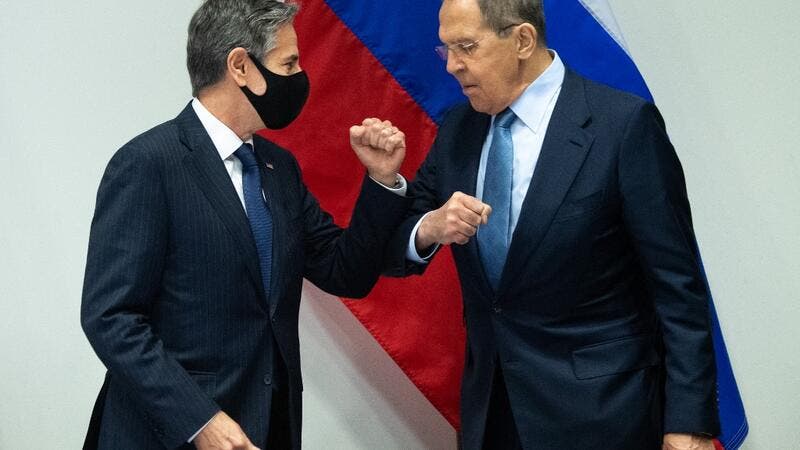The Kremlin hailed a decision by the US government to waive sanctions against major parties involved in the construction of the Russian-financed Nord Stream 2 gas pipeline, which is designed to facilitate Russian energy exports to Europe by way of Germany.
Russian President Vladimir Putin’s spokesperson Dmitry Peskov told reporters that Russia views Washington's move as a positive sign. At the same time, Peskov made it clear that the project will be completed despite all the difficulties.
"Regardless of this decision, the work was carried out and more than once we stated our intention to complete this project as soon as possible," RIA Novosti quoted Peskov as saying on Thursday.
Earlier on Wednesday, the US Department of State issued Secretary of State Antony Blinken's letter to Congress, which stated that waiving the original sanctions imposed by Congress on Swiss-based Nord Stream 2 AG and its chief executive Matthias Warnig, "is in the national interests of the United States". Although sanctions will still be imposed on four ships and five organizations, as well as one individual involved in the construction of the gas pipeline, the US move to lift sanctions on some parties of the project was a significant reversal of Washington’s earlier stance on the matter.
The 1,230-kilometer pipeline, now more than 95 percent complete, has become a matter of contention between Moscow and Washington. The latter views the project as a geopolitical security risk and was seeking to cut Europe’s reliance on Russian energy. At the same time, Washington has been pushing officials in Europe to abandon the project and instead purchase American liquefied natural gas (LNG) as an alternative.
Russian energy giant Gazprom owns a majority stake in the project, working alongside an international consortium that includes Germany’s Wintershall and Uniper groups, Dutch-British giant Shell, France’s Engie and Austria’s OMV.
The $11-billion pipeline follows the route of the original Nord Stream 1 pipeline, which became operational in 2011. The twin lines run along the bottom of the Baltic Sea and traverse the territorial waters of Russia, Finland, Sweden, Germany and Denmark.
Russian officials believe that the US move will alter relations between Russia and the United States, which have deteriorated in recent years to levels not seen since the Soviet Union was at odds with the US during the Cold War. Russia's Deputy Foreign Minister Sergei Ryabkov called the possible waiver of sanctions a step towards normalizing relations between Moscow and Washington.
Meanwhile, America's top diplomat Blinken and his Russian counterpart Sergei Lavrov's first in-person meeting at an international summit in Reykjavik, Iceland, on Wednesday, was seen by analysts as a positive development that paving the way for a potential meeting between President Vladimir Putin and US President Joe Biden.
"It is obvious that the process won't be easy" TASS quoted Peskov as saying following the first face-to-face encounter between the high-level officials since relations deteriorated between the two countries. "Indeed, many problems have come together."
Tense relations between the two former Cold War foes soured after Biden in March said he thought Putin was a "killer," prompting Moscow to recall its ambassador to Washington.
Less than a month later, the White House slapped Russia with fresh sanctions, a move that included the expulsion of 10 Russian diplomats from the US, leading to a tit-for-tat response from the Kremlin. Moscow expelled ten US diplomats and restricted the activity of those remaining in the country. In addition, the Russian government called on Washington’s ambassador to Moscow John Sullivan to leave the country for consultations amid rising tensions between the two countries.







 The Mine Action Agency of Azerbaijan (ANAMA) reported on Thursday the discovery of a significant amount of explosives in the Khojavand district of ...
The Mine Action Agency of Azerbaijan (ANAMA) reported on Thursday the discovery of a significant amount of explosives in the Khojavand district of ...
 Iran has refuted reports of alleged damage to Shimon Peres Negev Nuclear Research Centre located southeast of Dimona, Israel, during the recent air...
Iran has refuted reports of alleged damage to Shimon Peres Negev Nuclear Research Centre located southeast of Dimona, Israel, during the recent air...
 Iran’s Foreign Minister, Hossein Amir-Abdollahian, has labeled a foiled Israeli drone attack in certain parts of the country as a "failure" for Isr...
Iran’s Foreign Minister, Hossein Amir-Abdollahian, has labeled a foiled Israeli drone attack in certain parts of the country as a "failure" for Isr...



